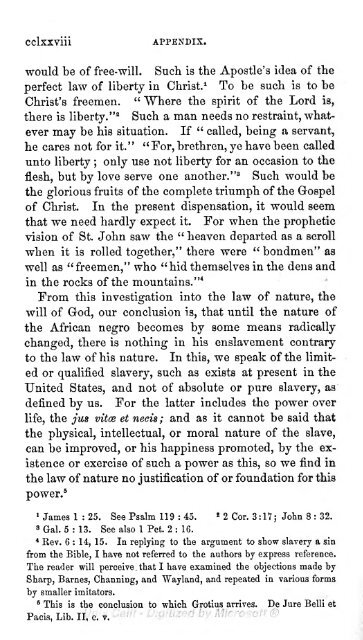Untitled - African American History
Untitled - African American History
Untitled - African American History
You also want an ePaper? Increase the reach of your titles
YUMPU automatically turns print PDFs into web optimized ePapers that Google loves.
cclxxviii APPENDIX.<br />
would be of free-will. Such is the Apostle's idea of the<br />
perfect law of liberty in Christ. 1 To be such is to be<br />
Christ's freemen.<br />
" "Where the spirit of the Lord is,<br />
2<br />
there is liberty." Such a man needs no restraint, what-<br />
ever may be his situation. If " called, being a servant,<br />
he cares not for it." "For, brethren, ye have been called<br />
unto liberty ; only use not liberty for an occasion to the<br />
flesh, but by love serve one another." 3 Such would be<br />
the glorious fruits of the complete triumph of the Gospel<br />
of Christ. In the present dispensation, it would seem<br />
that we need hardly expect it. For when the prophetic<br />
vision of St. John saw the " heaven departed as a scroll<br />
when it is rolled together," there were "bondmen" as<br />
well as "freemen," who "hid themselves in the dens and<br />
in the rocks of the mountains." 4<br />
From this investigation into the law of nature, the<br />
will of God, our conclusion is, that until the nature of<br />
the <strong>African</strong> negro becomes by some means radically<br />
changed, there is nothing in his enslavement contrary<br />
to the law of his nature. In this, we speak of the limit-<br />
ed or qualified slavery, such as exists at present in the<br />
United States, and not of absolute or pure slavery, as<br />
defined by us. For the latter includes the power over<br />
life, the jus vitce et necis; and as it cannot be said that<br />
the physical, intellectual, or moral nature of the slave,<br />
can be improved, or his happiness promoted, by the ex-<br />
istence or exercise of such a power as this, so we find in<br />
the law of nature no justification of or foundation for this<br />
power. 5<br />
1 James 1 : 25. See Psalm 119 : 45.<br />
3 Gal. 5 : 13. See also 1 Pet. 2 : 16.<br />
2 2 Cor. 3:17; John 8 : 32.<br />
4 Rev. 6 : 14, 15. In replying to the argument to show slavery a sin<br />
from the Bible, I have not referred to the authors by express reference.<br />
The reader will perceive that I have examined the objections made by<br />
Sharp, Barnes, Channiug, and Wayland, and repeated in<br />
by smaller imitators.<br />
various forms<br />
6 This is the conclusion to which Grotius arrives. De Jure Belli et<br />
Pacis, Lib. II, c. v.


